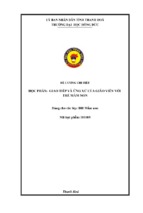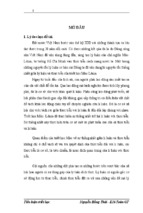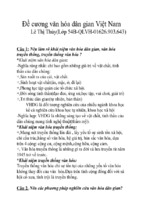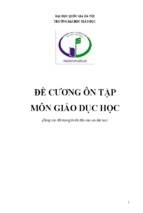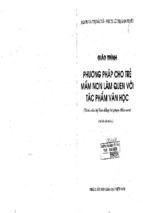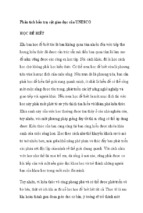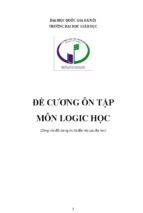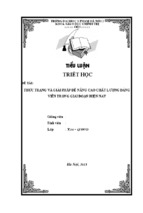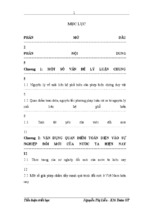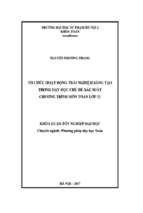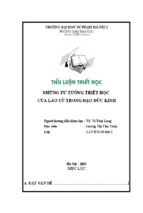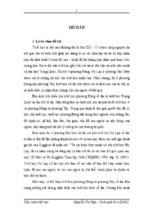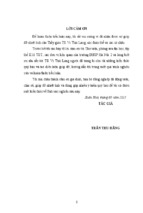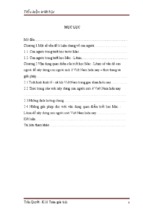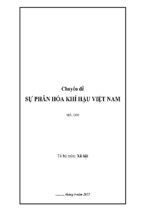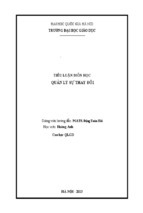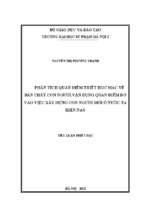DECLARATION
The writer fully declares that this research paper is composed by the writer
herself, and it does not contain materials written or having been published by other
people and that from other references.
A THESIS
Language games in learning vocabulary of students of grade 6
at Thinh Duc lower secondary school in Thai Nguyen City.
Submited by:
Pham Thuy Nga
Approved by
Supervisor,
Instructor 1: Dr. Hoang Thi Nhung
Instructor 2: Dr. Phan Thi Hoa
i
ACKNOWLEDGEMENT
The thesis on “Language games in learning vocabulary of students of grade 6
at Thinh Duc lower secondary school in Thai Nguyen City.” came to completion.
First of all, I would like to express my deepest gratitude to my supervisorsDr Hoang Thi Nhung and Dr Phan Thi Hoa for their valuable guidance, critical
feedback, and enormous encouragements. Without their support, this thesis could
not have been completed.
My thanks also go to all my lecturers from Thai Nguyen University, School
of Foreign Languages- Postgraduate Department for their valuable lectures which
help me to orient the topic.
I would like to express my thanks to all my classmates who were willing to
help me in sharing materials and ideas when this thesis is worked on.
My sincere acknowledgement of all English teachers and students at Thinh
Duc Lower secondary school who have helped me to carry out the survey for my
research.
The study has been progressed with all my attempts but there have been still
limitations and mistakes, Therefore, I look forward to receiving sincere comments
from all of you!
ii
ABSTRACT
This study aims at improving secondary students’ vocabulary by using
language games and find out the impact of using language games on young
learners’ learning English vocabulary.
It also describes students’ perceptions and feeling after experiencing
language game method.
This research is action research which was conducted in Thinh Duc Lower
Secondary School in Thai Nguyen City in the second term of the academic year
2018-2019. It consists of planning, implementing the action, observing, reflecting.
The data were gained through tests, questionnaires, and observation sheets. The data
attained from those instruments were analyzed using the formula to calculate the
mean, target of study, questionnaire percentage. The data then were interpreted
descriptively. The result of the study showed that language games can improve
young learners’ English vocabulary during the learning process. In addition, it also
improved students’ marks in the learning process. Furthermore, according to
students, this teaching method is considered as a fun, good, stress-less method that
helps them to memorize English words easily and makes their learning easier.Key
words: language game, vocabulary, young learners.
iii
TABLE OF CONTENTS
ACKNOWLEDGEMENT ......................................................................................... ii
ABSTRACT .............................................................................................................. iii
TABLE OF CONTENTS ......................................................................................... iv
LIST OF TABLE ...................................................................................................... vi
LIST OF CHART ..................................................................................................... vii
CHAPTER 1. INTRODUCTION ...............................................................................1
1.1. Background of the study ................................................................................................ 1
1.2. Objectives of the study................................................................................................... 2
1.3. Scope of the study ........................................................................................................... 3
1.4. Limitation .......................................................................................................................... 3
1.5 The significance of the study ......................................................................................... 3
1.6 Organization of the study. .............................................................................................. 4
CHAPTER 2. LITERATURE REVIEW ....................................................................5
2.1. Language games .............................................................................................................. 5
2.1.1 Roles of language games .............................................................................6
2.1.2 Main types of language games ....................................................................7
2.1.3 Advantages of language games ................................................................................. 9
2.1.4 The Use of Language games with elementary ..........................................10
2.2. Vocabulary ...................................................................................................................... 11
2.2.1 What is vocabulary? ..................................................................................11
2.2.2 Types of vocabulary ..................................................................................12
2.2.3 Importance of vocabulary..........................................................................13
2.3 Teaching vocabulary ...................................................................................................... 13
2.4 Learning vocabulary ...................................................................................................... 14
2.4.1 Steps for Learning Vocabulary .................................................................15
2.4.2 Technique of learning vocabulary .............................................................16
2.5 The importance of language games in learning vocabulary................................ 17
2.6 Characteristics of young learners ............................................................................... 18
2.7 Previous studies on the use of language games in learning vocabulary .......... 20
CHAPTER 3. RESEARCH METHODOLOGY ......................................................23
3.1 Research Questions ........................................................................................................ 23
iv
3.2 Method of the study ....................................................................................................... 23
3.3 The study design ............................................................................................................. 23
3.4 The participants. .............................................................................................................. 24
3.5 Materials............................................................................................................................ 24
3.6 Data collection instrument. .......................................................................................... 24
3.6.1 Tests ...........................................................................................................25
3.6.2 Observation ...............................................................................................25
3.6.3 The questionnaires .....................................................................................25
3.7 Data collection procedure ............................................................................................. 26
3.8 Data analysis .................................................................................................................... 27
3.8.1 Quantitative data........................................................................................27
3.8.2 Qualitative data..........................................................................................28
CHAPTER 4. FINDINGS AND DISCUSSION.......................................................30
4.1 Findings ............................................................................................................................. 30
4.1.1 Student’s performance in the pre-test and post-test ..................................30
4.1.2. Results from questionnaires and observation ...........................................35
4.2. Discussions ...................................................................................................................... 38
4.2.1 Are there any differences in the results between learning vocabulary use
language games and learning vocabulary without language games? .................38
4.2.2 What is the attitude of learner when learning vocabularies through
language game? ..................................................................................................39
CHAPTER 5. CONCLUSIONS AND RECOMMENDATION ..............................41
5.1. Conclusion ....................................................................................................................... 41
5.2 Suggestions ....................................................................................................................... 45
REFERENCES ..........................................................................................................46
APPENDIX 1 .............................................................................................................. I
APPENDIX 2 ........................................................................................................ XVI
APPENDIX 3 ...................................................................................................... XVIII
APPENDIX 4 ....................................................................................................... XXII
APPENDIX 5 ....................................................................................................... XXV
v
LIST OF TABLE
Table 1: The students’ performance under traditional vocabulary instruction and
language games in the pre-test. ..................................................................30
Table 2: Students’ vocabulary ability in pre-test ......................................................31
Table 3: Students’ performance under the two methods in post-test. ......................32
Table 4: Comparison between the pre-test and post-test vocabulary ability of the
students taught under traditional vocabulary instruction. ..........................32
Table 5: Comparison between the pre-test and post-test vocabulary ability of the
students taught with language games. .......................................................34
Table 6: Comparison between the post-test vocabulary ability of students taught
under the two methods. ..............................................................................35
Table 7: Pupil’s activities in the teaching-learning process ......................................37
vi
LIST OF CHART
Chart 1. Pupils’ activities in teaching - learning process
vii
CHAPTER 1
INTRODUCTION
This chapter presents the introduction of the study. It is divided into five
parts, including: the background of the study, the objectives of the study, the scope
of the study, limitation and significance of the study and organization of the study.
1.1. Background of the study
Language is very important in social relationships. It is a means of
communication to help people interact, converse, and also share with others. Each
country has their mother tongues. Among a large number of different languages in
the world, English is considered as an international language or a second most
popular language that is the reason why many people want to learn it. The
globalization has been motivating the demand for English. It is necessary for
everyone to use English to communicate with foreigners to set them free from
language boundaries. Being able to use English in conversation among people from
different countries will bring them closer.
Due to the importance of English, it has been taught in all levels of education
systems in Vietnam. To improve human resources, the Vietnam government makes
policy by introducing English as early as possible to elementary school students. In
Vietnam’s schools, English is learned from the kindergarten level to university or
even higher. To bring English closer to students’ life, many familiar topics were
designed for each level with the purpose of providing the necessary knowledge for
students to help them have a good preparation for important skills, especially
language skills, which is necessary for their future jobs.
There are four skills in learning English, including listening, speaking,
reading, and writing. If students want to master these skills, it is extremely to have a
good range of vocabulary. However, in spite of highly appreciating the important
role of learning vocabulary, many Vietnamese students learn vocabulary passively.
There are many reasons that could explain this. First, they think that explanations
for meaning or definition, spelling, grammatical functions, and pronunciation are
boring and they are fed up with that. In addition, with the traditional method, the
student is not the learning center. All that they have to do is to listen attentively to
the teacher without any activities. Second, students believe that learning vocabulary
means knowing the meaning of the words only and they do not care about the other
1
functions of the words. Third, students are not active, they just lean what they are
given from textbooks or teachers. For example, learners find many new words in a
text and then ask the teacher to explain the meanings and usages. Therefore, they
can get trouble with other skills because they may recognize a word in a written, but
they do not know when it is spoken. Because of the passive learning habit, students
will get bored during the lessons. Teaching vocabulary is a challenge for all
teachers at all levels, especially for young learners. There remain so many
requirements for the teachers to create an enjoyable and comfortable environment
for the students to learn and make them an interest in learning vocabulary. To stop
these stressful things, language games are considered as one of the most suitable
and effective methods.
At Thinh Duc Lower secondary school, I am also given a responsibility to
teach the sixth grade in Thinh Duc Lower secondary school. As a teacher, I
prepared the materials for the lesson. The material was Basic English. The basic one
is just they study the vocabularies to enrich their capabilities in learning English.
The most perfect way to make effective activity in learning vocabulary to the young
learner is by using the game. As a technique in learning vocabulary, using game is a
must to get the main purpose of learning activity since students always like some
fun activities.
It is in this context that the researcher would like to conduct the study in the
hope that language games may be effective in getting the students to get involved
and to participate more in lesson activities, specifically in improving their
vocabulary. This research attempts finding the answer to the following questions:
1. Are there any differences in the results between learning vocabulary use
language games and learning vocabulary without language games?
2. What is the attitude of learner when learning vocabularies through
language game?
1.2. Objectives of the study
The purposes of the study are to improve secondary students’ vocabulary by
using languages game and find out the impact of using languages game on young
learners learning English vocabulary.
2
1.3. Scope of the study
In the school year 2018-2019, the researcher was designated to teach English
to the sixth-grade students at Thinh Duc Secondary School in Thai Nguyen City. In
fact, there are many techniques and methods used to improve students’ vocabulary
and there are also a variety of ways of using language games in improving other
skills. However, regarding her mentioned- pre-observation of students and the limit
of the thesis, the researcher is going to focus on improving student’s vocabulary by
using language games and describe the student’s perception and feeling after
experiencing using the language game method. This study will be conducted on 74
students in 2 classes 6A and 6B of grade 6 in the second term of the school year
2018- 2019 at Thinh Duc Lower secondary school in Thai Nguyen city.
1.4. Limitation
The study will be conducted in the second term of the school year 2018-2019
at Thinh Duc lower secondary school- Thai Nguyen city. Language games will be
used in teaching 4 lessons (Getting started and A closer look 1 of Unit 8 & 9) in the
English course book of grade 6.
The samples of this study are 74 students of grade 6A & 6B at Thinh Duc
lower secondary school.
1.5 The significance of the study
The findings of the study will provide the effectiveness of using language to
increase the sixth- grade students’ vocabulary in Thinh Duc Lower Secondary
School. It is also a strong base to carry out in other secondary schools in Thai
Nguyen and other places in Viet Nam to enhance student’s vocabulary at a higher
level by using language games.
The study is important because of several reasons. First and foremost, the
finding will be able to provide English teachers with a better perception of the use
of a variety of language games in their classrooms. It is also so that teachers are
more motivated to use language games as a tool to improve their pupils’ linguistic
abilities. The use of language games in learning English is beneficial not only for
teachers but for the pupils as well. Language games are able to promote healthy
competition among pupils in the classroom. It also helps in creating a non-
3
threatening learning environment. It also provides opportunities for pupils to use
and practice the language in useful and meaningful ways.
It also to change English teachers' minds and for them to not view language
games in the classroom as burdensome because of all the many stages of
preparation needed before they can be carried out effectively. It is so as to shine a
light on the many benefits that the teachers will get rather focus on the extra effort
they need to put in compared to their usual lesson planning.
1.6 Organization of the study.
Chapter 1 is Introduction which consists of the background of the study, objectives
of the study, scope of the study, the significance of the study and organization of the
study.
Chapter 2 is Review of related literature which discusses teaching and learning
foreign language in secondary school, characteristic of young learners, the
importance of vocabulary in teaching and learning foreign languages, Language
games in the classroom, Languages in teaching vocabulary.
Chapter 3 is Research methodology which consists of research questions, the study
design, participants, materials, and procedure, data collection instruments,
techniques of data analysis and indicators of success.
Chapter 4 describes the result of the study. It consists of research findings and
discussion. Then, chapter 5 is the conclusion and suggestions of the research.
4
CHAPTER 2
LITERATURE REVIEW
According to the study’s purpose, which focus on investigating the
effectiveness of language games in learning vocabulary for sixth grade students at a
lower secondary school in Thai Nguyen city, this part is divided into two sections.
The first section is about language games, which consist of roles, main types,
and language game in learning vocabulary, the use of language games in process
teaching-learning vocabulary .The second section is about vocabulary learning,
steps for learning vocabulary.
2.1. Language games
There are many ways to define the term game. In the Oxford dictionary, the
game is defined as “an activity or a sport with rules in which people or teams
compete against each other”.
Jones (1980) expressed that game means one or more players compete or
cooperate following a set of rules. Rogers (1981) also indicated that game is the
goal – defined, rule-governed, and competitive that closure and engage the students.
Language games lead students to be more self-confident and achieve better
results. The role of language games in teaching vocabulary cannot be denied; they
bring real-world context into their classrooms. They acquaint students with new
items and help them consolidate lexical knowledge of words. They can keep their
minds active through playing with words and letters that help also developing their
communicative competence.
Language games refer to some pair or group activities which teachers use to
motivate students to get involved in learning vocabulary in each period. The idea of
using games in teaching does not seem to be widely accepted and implemented
although its profitability has been proposed and justified as early in the seventieth
century. There has been a misconception that all learning should be serious in
nature. Utilizing games is a vital tool that provides joy for the class. They are
particularly valuable for beginners as a source of cognition that helps them adapt
sounds and rhythms and comprehend the foreign language Byrne (1995) argues that
a game is a form of play governed by rules. They should be enjoyable and fun. They
are not just a diversion, a break from routine activities, but a way of getting the
5
learner to use the language in the course of the game. El Shamy (2001, p.15) states a
game as a “competitive activity played according to rules within a given context,
where players meet a challenge to achieve an objective and win”. Language games
comprise many factors such as rules, competition, relaxation, and learning in
particular. Rules have to be clear, few, and well-explained so as no difficulty is
faced. They are designed in numerous levels and topics that are suitable for
different students’ levels to make them enjoy and have the best results.
2.1.1 Roles of language games
Language games are an important role in learning English, which makes a
great contribution to raise students’ interest in learning. Additionally, language
games can motivate students to learn and provide a relaxed atmosphere in the class.
The importance of language games in English foreign language classrooms has been
studied by many researchers in the world.
Language games can be considered as a system to supply an important
setting for language acquisition. Constantinescu (2012) proved the role of language
games in enhancing students’ understanding of writing and speaking skills. Games
help learners remember new words and structures easier. Additionally, those games
work effectively in correcting students’ mistakes.
In recent years, teachers have to make the best use of language games to
attract students and help them memorize words quickly and deeply. It is undeniable
that the game always attracts students a lot. According to Mei & Yu – Jing (2000),
all learners react positively to games, with the regardless of ages, genders, or
characters. These researchers also added games to motivate learners and remain
their interest for the whole lesson. Moreover, the game can be an effective thing to
help students reduce stress after tired learning hours.
Language games are alternative solutions to create a positive and successful
environment. In this way, students and their learning are central. It is a fact that a
large number of students are not interested in learning a foreign language; therefore,
they do not focus on lessons. More importantly, an ordinary and boring lesson will
make students fed up with learning that subject. To deal with this problem, using
language games is essential.
6
Language games differ from other activities (craft activities, songs, drills,
etc.) in the idea that there is the presence of a visible set of rules which guide the
students’ actions and that they are a strategy for which students apply the language
skills. Language games can be competitive. Students can compete against one
another or they can use their language skills strategically in cooperative games,
where they form groups to work together and achieve a goal. The use of language
games helps students challenge their analytical thought since they must make their
decision-making processes function. But when working with beginners, the
decision-making process is reduced to the substitution of a single word in a phrase.
For language games to be successful it is necessary to set the rules and to define the
goal very clearly, but of course, the games must be fun.
2.1.2 Main types of language games
Due to the importance of language games in English foreign language (EFL)
classrooms, teachers have to pay more attention to the kinds of games that
they use in the class. According to Hadfield (1984), there are two ways to
classify language games, consisting of linguistic games and communicative
games. Further, composed of both linguistic and communicative types,
games are divided in more details as following:
Sorting, ordering on arranging games: students have a set of cards with
different products, and what they have to do is to sort the cards into products
found at a department store.
Guessing games: there is a variation on information gap games one of the
best-known examples of a guessing game is 20 questions, in which one
person thinks of a famous person, place, or thing. The other participants can
ask 20 yes/no question to find clues on other to guess.
Information gap games: in such games, one or more people have information
that other people need to complete a task, for instance, one person might
have a drawing and his friend’s duty is to create the same drawing by
listening to the given information.
Search games: these games are a variant on two-way information gap games
with everyone giving and seeking information. Find someone who is a great
example. Students are given a grid. The task is to fill in all the cells in the
7
grid with the game of a classmate who first that cell. Someone who is a
vegetarian student circulates, asking and answering the question to complete
their grid and help classmates to complete the task.
Matching games: as the name implies, participants need to find a match for a
word picture, or card, for example, students place 30-word cards, composed
of 15 pairs, face down in random order. Each person turns over two cards at
a time, intending to turn over a matching pair, by using their memory.
Labeling games: these are a form of matching, in that participants match
labels and pictures.
Exchanging games: in these games, students’ barter cards, other objects, or
ideas similar are exchanging and collecting games. Many card games fall
into this category. Such as the children’s card game go fish.
Board games: scrabble is one of the most popular board games that
specifically highlight language.
Roleplay games: Roleplay can involve students playing the role that they do
not play in real life, such as a dentist. While simulations can involve students
performing roles that they already play in real life or might be likely to play,
such as a customer at a restaurant. Dramas are normally scripted
performances, and simulations, students come up with their own words
although preparation is often useful.Language games may be also classified
as follows:
- Listening games: In class, listening is often carried out in a boring and
uninteresting way what makes the lesson more stressful. To make students enjoy
listening, the teacher needs to bring it closer to them. A good way is the use of
listening games to maintain the students’ attention and interest.
- Speaking games: They can be used at any time, especially as a follow-up to
the previous listening to reinforce vocabulary and expressions heard earlier. Their
main aim is to make speaking and expressing ideas orally enjoyable and stress-free.
- Kinetic games: They provide refreshments in the class, especially when
students are getting tired and find it difficult to concentrate. They need always to be
joined with another activity of reading, listening, or speaking.
8
- Experiential games: Their real aim is not to win or complete a language task
but to experience the process and learn from it. They may influence peoples‟
attitudes and teach them the understanding of themselves and the phenomenon
around them as well.
2.1.3 Advantages of language games
In English foreign language classrooms, games provide many benefits to improve
students’ proficiency. One of the most important advantages of language games is to
reduce learners’ anxiety in learning the language. Games help them have a more
positive feeling, instead of negative feeling as normal. Students will become more and
more confident without the fear of criticism and punishment (Crookall, 1990).
Apart from the above benefits of language games in EFL classrooms, in 2012,
Constantinescu listed some other advantages as followings:
- “Games build-up learners’ English repertoire in a familiar and comfortable
environment (even for students who may have special needs”, where they feel
confident. More than this, English is widely used with computers
- Games increase motivation and desire for self – improvement.
- Challenge and competition are key factors for any game and students pay more
attention to completing the task.
- Interdisciplinary approach. Students use knowledge from other classes, too.
- Games develop students’ ability to observe.
- Games have clear rules and objectives.
- Games develop critical thinking, problem-solving, and imagination.
- Games offer new and dynamic forms of teaching/ practicing that replace the
traditional worksheets.
- Games are adaptable for different levels of knowledge.
- Educational games are easy to understand and use.
- Educational games do not take a long time to be played in the class.
- There are many online educational games that are free of charge.
- Immediate feedback both for the students and the teacher.
- The results are more visible (sometimes both visual and acoustic) and have a stronger
impact.
- The working time is usually known from the beginning and it is respected.
9
- The game facilitates collaborative learning but, at the same time, students may learn
at their own speed and cognitive level.
- Games may be used in the classroom as rewards for students”.
In short, language games have gained popularity in the education field, which is
beneficial for both teachers and English learners. Besides, it is also an effective way to
reinforce language skills.
2.1.4 The Use of Language games with elementary
Using games in language teaching is not obligatory, but it is useful for every
lesson with them regardless of the topics.
According to Nalasco and Arthur (1991, p.76), “in addition to the personal
challenge, younger students also enjoy competing with their peers, and introducing
a game element is a way of livening up any material”. Game is not the most
important part of teaching languages, but it is a helpful tip to keep students focusing
on learning. The difficulty that all teachers have to face is how to make their
learners engaged in lessons. Therefore, using different games is the best solution.
Lee illustrated that using games “should not be regarded as a marginal activity
filling in odd moments when the teacher and class have nothing better to do.”
(1979: 3). Using a game can bring many advantages for both learners and teachers,
as listed below:
In cases of lack of interest, a language game can be fun for students and help
them feel being motivated.
When students feel tired, it is so hard for him to perform the best. A language
game can help him overcome the difficulties and gain more knowledge.
When students are not good at team work, a language game has great
potential to bring them together and know how to co-operate.
When teachers have extra time after the planned work and do not know what
to do, a language game can be a saver to avoid wasting time.
If students need to review what they have learnt before, but the teachers are
lack of ideas for activities, a language game is a better choice.
If students lack the vocabulary knowledge which the game requires. Ø When
there is not much time available because it may create an anxious feeling if it
has to be done in a limited time.
10
If students are misbehaving, they need to calm down to reach the game’s
purpose.
If there is no co-operation with the teacher.
2.2. Vocabulary
2.2.1 What is vocabulary?
Hornby (1995) defined vocabulary as the total number of words in every
language. Aside from this definition, the Oxford dictionary noted vocabulary as the
body of words used in a particular sphere and as the total number of words that
make up a language (2007). In Longan Dictionary (1995), vocabulary is defined as
all the words that someone knows, learns, or uses.
Vocabulary refers to a new word or phrase that students are exposed to and
learn to use during and after each period. Since vocabulary is one element that links
the four skills of speaking, listening, reading, and writing altogether, its definition
relates to various views about its nature and its use. Vocabulary is the total number
of words in a language (Hornby, 1995). The Oxford dictionary defines vocabulary
as the body of words used in a particular sphere and as the total number of words
that make up a language (2007). In Longman Dictionary (1995), vocabulary is
defined as all the words that someone knows, learns, or uses.
Todd (1987) argues that there are four aspects of the word; the orthographic
word has a space on both sides of it. A morphological word considers the form only.
A lexical word considers all the forms a word can take and which are clearly related
by meaning. A semantic word considers the distinction between items that may be
morphologically identical but differ in meaning.
Vocabulary comes into oral and print forms; the former refers to words used
and recognized in speaking and listening, and the latter denotes all words
recognized in reading and writing.
This paper refers to the learning of vocabulary in English, and the word
Lexis is also used. For a better comprehension of this work, we will define the terms
Vocabulary, Lexis, and Lexicon. Vocabulary and Lexis refer to all the words in a
particular language, and in the dictionary, we can find the same definition for both
of them; According to the Longman Dictionary of Contemporary English (2009)21,
vocabulary and lexis refer to “all the words in a particular language.” However,
11
Vocabulary is used most commonly when we want to refer to the words used in a
particular context or known to a particular person. On the other side, we also have
the term Lexicon, which differs from the two previous words, refers to all the words
and phrases used in a language or that a particular person knows; this means that not
only words are considered but also the knowledge and comprehension of the person
who uses it. Therefore vocabulary is words.
Learning vocabulary is likely to be one of the biggest challenges that
students will face in their studies. Among all language skills, vocabulary learning is
as significant in language learning as it's challenging. As Wilkins puts it without
grammar very little can be conveyed; without vocabulary, nothing can be conveyed
(Wilkins, 1972). Vocabulary is central to language and of critical importance to the
typical language learners Lack of vocabulary knowledge will result in a lack of
meaningful communication (Boyd Zimmerman, 1997).
Learning vocabulary is hard work, so an attempt is required to understand,
produce, and manipulate the target words. Games help and encourage many learners
to learn the target language more easily. They also help teachers to create contexts
in which the target words are useful and meaningful; they also bring fun for
students, thus help them learn and retain new words more quickly. After learning
and practicing new vocabulary through games, students have the opportunity to use
language in a nonstressful way (Uberman, 1998).
2.2.2 Types of vocabulary
Vocabulary can be divided into many ways, but most popularly, there are
two kinds, including active and passive vocabulary. Active vocabulary: This type of
vocabulary refers to the ones students have learnt and that are expected to be used,
that is, to be put into practice. Thus with the students at basic level, it will be an
excellent idea to provide them of vocabulary that they will use (active); however,
with the upper level students the acquisition of basic vocabulary will not be very
notorious, this is expressed by Harmer (2010, p.18) 22 who states that with the
students of the intermediate and advanced level, this will be more difficult since
they have already acquired more vocabulary and therefore, it will be hard to
distinguish which words are active and which ones are passive, sometimes they
believe they are not making much progress nor are learning fast.
12
Passive vocabulary: With this vocabulary, students will just have to
understand; there will not be a need to use them frequently. For example; when
students read a text or a piece of writing, they do not learn all the words, but the
main ones. However, there can also be some passive words that suddenly become
active if the situation or context provokes their use. On the other hand, if a person
does not have a stored word in his/her passive vocabulary, it will be difficult that
that word becomes part of his/her active vocabulary.
2.2.3 Importance of vocabulary
Through years, methods for teaching English have focused on the teaching of
grammatical structures, giving thus priority to grammar so students cannot distract
from learning them, and in this way, the teaching of words was kept fairly low.
Vocabulary, supposed to be learned, was just demonstrated because they were part
of the “structure of the day lesson” It was believed that “…vocabulary is largely a
collection of items and that grammar is a system of rules. Thus one rule can
generate a great number of sentences, therefore it was considered to be more
productive. Grammar multiplies, while vocabulary merely adds.” (Thornbury, 2004,
p.14) 23. However, years have passed and the idea that grammar is superior to
vocabulary has changed. Two key developments challenged the supremacy of
grammar: lexical syllabus (a syllabus based on those words that appear with a high
degree of frequency in spoken and written English) and the role of lexical chunks.
These two developments have helped to be aware that vocabulary also plays a key
role in language learning. Even if most coursebooks still adopt a grammar syllabus,
vocabulary is no longer seen as an “add-on”. As David Wilkin (Thornbury, 2004, p.
13) 24 states, “Without grammar very little can be conveyed, without vocabulary,
nothing can be conveyed.” Here lies the importance of vocabulary learning.
Likewise, studies have shown that success in school is related to the number of
vocabulary students may have, which means that if students have a poor amount of
vocabulary, they will perform poorly in their learning (Anderson & Naggy cited by
Mackay, 2007).
2.3 Teaching vocabulary
Teaching vocabulary is more than just presenting new words, it is above all,
to allow the students to know words that they can use to express their feelings and
13
- Xem thêm -


